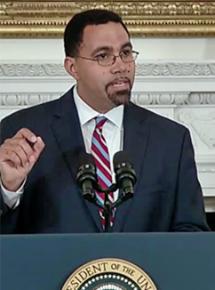The education deform empire strikes back
The battle over high-stakes testing and the future of public education is back in play after the Obama administration's latest moves, writes .
THE PROPOSED regulations for national implementation of the Every Student Succeeds Act (ESSA) signal that new Education Secretary John King is determined to continue the Obama administration's relentless emphasis on high-stakes testing--by financial blackmail if necessary.
The passage of ESSA in late 2015 appeared to offer a concession to the growing concern that public schools are being taken over by high-stakes testing, which degrade curriculums and are misused to shame and blame teachers for the outcomes of an impoverished public education system and justify closing public schools in order to privatize the system with charters.
Enacted after a spring of historically high boycotts of exams around the country, ESSA gives each state the ability to determine how to meet the prescribed 95 percent participation rate in federally mandated tests that are given each year from 3rd to 8th grade and once in high school.
But in what can only be read as a tightening of the noose around the growing movement to "opt out" of state tests, King's new regulations threaten states with financial sanctions should they fail to put a stop to test boycotting.

Here is how a Department of Education (DOE) summary puts it:
The proposed regulations do not prescribe how those rates must be factored into accountability systems, but they do require states to take robust action for schools that do not meet the 95 percent participation requirement. States may choose among options or propose their own equally rigorous strategy for addressing the low participation rate. In addition, schools missing participation rates would need to develop a plan, approved by the district, to improve participation rates in the future.
For many supporters and participants in the opt-out movement who believed that the tide was finally beginning to turn in their favor, these regulations are a sobering alert that the fight to ensure that students are treated as more than a score is far from over.
King might be the new Education Secretary, but he is making the same old mistakes: not respecting the voices of parents, teachers and students; doubling down on threats to financially punish students for boycotting tests; and digging in his heels to prevent the long overdue termination of standardized testing.
NEW YORK, where King was the state education commissioner before his promotion this January, has been at the center of these swirling crosscurrents as officials scrambled to contain the crisis of testing legitimacy.
More than 200,000 students opted out of the New York's standardized tests in 2015, and it's estimated that similar numbers refused the tests this spring--one of the largest test boycotts in U.S. history.
When the record-breaking opt-out numbers were released last August, King's successor as state education commissioner, MaryEllen Elia, warned that schools with high test refusal numbers could lose funding, but then quickly backpeddled in the face of public pressure.
Then in December, momentum seemed to decisively shift away from over-testing. On the national level, there was the passage of ESSA, an updated version of George W. Bush's awful No Child Left Behind Act that maintains the overall testing apparatus, but at least reduces the power of the federal government to use test scores as a weapon against schools.
Meanwhile, the New York Board of Regents unexpectedly voted to suspend some of the harmful practices associated with the tests, like tying teacher evaluations to student scores.
But now what looked like significant victories for the opt-out movement on both a local and national level appear to have been just temporary respites. Soon after the DOE's punitive new regulations were announced, DNAInfo reported that 16 New York City schools had been ruled ineligible for up to $75,000 in grants because of their high test refusal numbers.
Betty Rosa, the new state Board of Regents Chancellor, who is widely seen as sympathetic to the opt-out movement, claimed that the loss of potential funding wasn't a punishment from the state, but was instead an "unintended consequence" of the grants being tied to test scores.
Semantics aside, it appears that these schools might be the test case for New York to determine whether "robust actions" are capable of reining in the powerful opt-out movement.
SO IT looks like the heated battle over public education is still on. It's a battle that pits those who work for and/or send their children to public schools against those with a stake in seeing more funding diverted to testing companies and charter schools.
High-stakes standardized tests imbue toxic levels of stress into a school--as anyone who works in one knows quite well--bringing profit to education corporations at the expense of children's well-being. John King is the mediator of this conflict between everyday people and a hugely profitable testing industry, and it's clear what side he is on.
The opt-out movement has its work cut out for it, not least because both leading presidential candidates have dismal platforms for public education.
Donald Trump wants to gut the DOE and bust teachers' unions, and Trump University is an infamous example of the horrors of privatized education. But Hillary Clinton has a long record of backing charter schools and high-stakes testing. She should be confronted at every turn this fall by public education supporters demanding that she oppose these DOE regulations.
Parents, teachers and students fighting for everyone to have the right to a rich and meaningful education are going to have to continue building on the grassroots strategies that have made the movement to into the impressive force that it is today in order to meet this next round of challenges.


